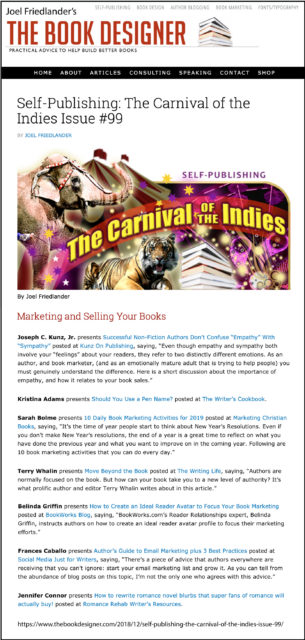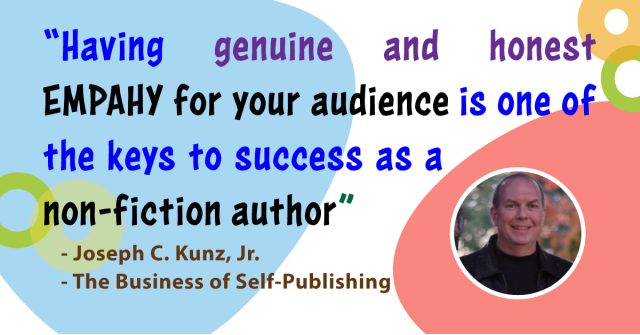Podcast: Play in new window | Download
Subscribe: Apple Podcasts | Spotify | Pandora | RSS | More
Updated February 16, 2023
Subtitle
Having genuine and honest empathy for your audience is one of the keys to success as a non-fiction author
Synopsis
Even though empathy and sympathy both involve your feelings about your readers, they refer to two distinctly different emotions. As an author, book marketer, and emotionally mature adult trying to help people, you must genuinely understand the difference. Here is a short discussion about the importance of empathy and how it relates to your book sales.

What You Will Learn
1. You will learn the difference between empathy and sympathy.
2. You will learn why understanding the difference will help you sell more books.
3. You will learn why empathy can help you create a great book.

Introduction
Do you genuinely understand for whom you are writing? And not in a superficial way. Knowing is the difference between building a devoted audience of followers, readers, and book buyers you help AND your time, words, and efforts being wasted and helping none. The difference is that empathy is a significant ingredient to your success as an author.
Successful Non-fiction Authors Do Not Confuse Empathy With Sympathy
Even though empathy and sympathy both involve your feelings about your readers, they refer to two distinctly different emotions. As an author, book marketer, and emotionally mature adult trying to help people, you must genuinely understand the difference.
Here is a short discussion of empathy and sympathy to get us started:
Definition # 1. Empathy: refers to your ability to “walk in your reader’s shoes.” You’re trying to get into their heads and understand their reality, feelings, and motivations. The more intimate knowledge or understanding you have about their reasons, questions, confusions, and desires, the more you and your book will genuinely help them find what they need and want. Deep down, you must know your audience and can’t fake it.
Definition # 2. Sympathy: refers to the compassion, sorrow, or pity you have for your readers. Empathy and sympathy typically go together. With sympathy, you might have compassion for your readers, but you don’t know what it is like to honestly and sincerely “walk in your reader’s shoes.”
And sympathy might have been an initial motivating factor to get you to write your book. But simply having sympathy with your readers does nothing to help them find answers and solutions. And sympathy alone certainly won’t help you sell more books.

You might ask yourself, “How can empathy for my readers improve my book sales?”
Empathy can be shown for the readers, and can improve book sales at the same time, in two easily achievable ways:
1. Having Empathy BEFORE You Write
Developing empathy for your reading audience before you write your book forces you to think precisely about who you are writing for. Who are you trying to help? Who can you relate to? Identifying your reading audience is imperative if you ever hope to build an audience that wants to listen to you and read your books.
Zeroing in on this specific group of people and building an audience who knows what you write about, what you are about personally, what knowledge you have, and how generous you are with your knowledge will help you to build an audience that will continue to grow over the long-term. This targeting is how you create a continuous income stream from your writing.
2. Having Empathy WHILE You Write
When writing non-fiction to share your knowledge and experiences with readers, you must have empathy for those readers. If you do, the readers will immediately see and understand that you can relate to them and their problems.
The readers will realize you are striving to help them improve their situations. This realization helps them to make an emotional connection with you. And it leads to a more devoted audience of followers, readers, and book buyers.

Conclusion
I believe that most people go into writing non-fiction out of a desire to help their audience find answers and solutions to their problems and questions. We write because we enjoy sharing information to others become more successful and happier.
We are writing to reach out to the world and lend a helping hand in the best way we know by writing on topics we are knowledgeable about. And it helps that we can make money for our writing efforts. This motivation would be a win-win for everyone involved.
But, on the other hand, if your motive to write is not at least partially to help readers improve their lives, then your books will be awful and help no one. And authors with the wrong motive will make very little money from their writing. This motivation would be short-sighted and a lose-lose for everyone involved.
Questions to Think About
1. Is your motive to help people, make money, or see your name in print? Or all three?
2. Did you understand who your audience was for your book before you started writing it?

